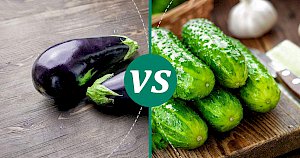Cucumber vs Eggplant: Calories & Nutrition Showdown


Cucumber vs Eggplant
Nutrition Facts
Serving size:
change
5g10g15g20g30g40g50g60g80g100g120g140g160g180g200g220g250g300g350g400g450g500g600g700g800g900g1000g
1oz2oz3oz4oz5oz6oz7oz8oz10oz12oz15oz20oz25oz30oz35oz40oz50oz
Amount Per Serving:
Serving size:
change
5g10g15g20g30g40g50g60g80g100g120g140g160g180g200g220g250g300g350g400g450g500g600g700g800g900g1000g
1oz2oz3oz4oz5oz6oz7oz8oz10oz12oz15oz20oz25oz30oz35oz40oz50oz
Amount Per Serving:
Cucumber vs Eggplant 100g Compare
| per 100g | Cucumber | Eggplant |
|---|---|---|
| Calories | 15 | 24 |
| Carbohydrates | 3.63 g | 5.7 g |
| Fat | 0.11 g | 0.19 g |
| Dietary fiber | 0.5 g | 3.4 g |
| Protein | 0.65 g | 1 g |
| Calcium | 16 mg | 9 mg |
| Iron | 0.28 mg | 0.24 mg |
| Magnessium | 13 mg | 14 mg |
| Potassium | 147 mg | 230 mg |
| Sodium | 2 mg | 2 mg |
| Zink | 0.2 mg | 0.16 mg |
| Vitaminium A | 105 µg | 27 µg |
| Vitaminium B1 (Thiamine) | 0.027 mg | 0.039 mg |
| Vitaminium B2 (riboflavin) | 0.033 mg | 0.037 mg |
| Vitaminium B3 (Niacin) | 0.098 mg | 0.649 mg |
| Vitaminium B5 | 0.259 mg | 0.281 mg |
| Vitaminium B6 | 0.04 mg | 0.084 mg |
| Vitaminium B9 (Folic acid) | 7 mg | 22 mg |
| Vitaminium C | 2.8 mg | 2.2 mg |
| Vitaminium E | 0.03 mg | 0.3 mg |
| Vitaminium K | 16.4 µg | 3.5 µg |
Discover the Nutritional Nuances: Cucumber vs. Eggplant
When it comes to filling our plates with colorful, nutritious vegetables, cucumbers and eggplants are often on the menu. Both of these vegetables are not only versatile in the kitchen but also offer a range of health benefits. Before diving into the nutritional battle between cucumber and eggplant, let's explore some interesting facts about these two popular veggies.
Cucumbers, with their crisp texture and refreshing taste, are primarily composed of water, making them incredibly hydrating. They have been cultivated for at least 3,000 years, with origins tracing back to India. Cucumbers are part of the Cucurbitaceae family, which includes melons and squashes.
Eggplants, on the other hand, boast a spongy texture that soaks up flavors beautifully, making them a staple in dishes like ratatouille, baba ganoush, and moussaka. Despite commonly being treated as a vegetable, eggplants are technically berries. Originating from India, they have been a part of human diets for thousands of years and are members of the nightshade family, alongside tomatoes and bell peppers.
Comparing the Nutritional Profiles
When it comes to nutrition, both cucumbers and eggplants have their unique offerings. Here's a closer look at how they compare:
- Calories: Cucumbers are very low in calories, with only 15 calories per 100 grams, compared to eggplants, which have 24 calories per 100 grams.
- Carbohydrates and Fiber: Eggplants contain more carbohydrates and fiber, with 5.7 grams of carbs and 3.4 grams of fiber, versus cucumbers' 3.63 grams of carbs and 0.5 grams of fiber.
- Protein: Both are low in protein, but eggplants lead slightly with 1 gram of protein compared to cucumbers' 0.65 grams.
- Vitamins and Minerals: Cucumbers are a good source of vitamin K, with 16.4 micrograms, and vitamin A, providing 105 IU per 100 grams. Eggplants, while lower in these vitamins, offer more in terms of B vitamins, especially niacin (vitamin B3) with 0.649 milligrams.
- Potassium: Eggplants are a superior source of potassium, offering 230 milligrams, compared to cucumbers' 147 milligrams.
Both cucumbers and eggplants are naturally low in fat and cholesterol-free, making them heart-healthy choices. Additionally, their high water content and fiber can aid in digestion and help maintain a healthy weight.
So, Which Is Healthier?
Deciding whether cucumbers or eggplants are healthier depends on what you're looking for in your diet. If you aim to increase your fiber intake or need more potassium, eggplants might be the way to go. However, for those looking to hydrate or reduce calorie intake, cucumbers could be more beneficial.
In the end, both cucumbers and eggplants offer valuable nutrients and health benefits. Incorporating a variety of vegetables into your diet is key to getting the range of vitamins, minerals, and antioxidants your body needs. So, why not enjoy both? Whether you're preparing a light cucumber salad or a hearty eggplant parmigiana, you're making a choice that's good for your health.
Remember, the best diet is one that's balanced and tailored to your personal health needs, so consider the unique benefits of each vegetable. Happy eating!
Cucumber 100g
15kcalCalories source
- 80% CARBS.
- 14% PROTEIN
- 5% FAT
Eggplant 100g
24kcalCalories source
- 80% CARBS
- 14% PROTEIN
- 6% FAT
Compares of cucumber
- Cucumber vs Artichoke
- Cucumber vs Arugula
- Cucumber vs Asparagus
- Cucumber vs Beetroot
- Cucumber vs Pepper
- Cucumber vs Bok Choy
- see all compares of cucumber
Marcin Piotrowicz
calories-info.com creator
Healthy diet and healthy lifestyle promoter
Add comment